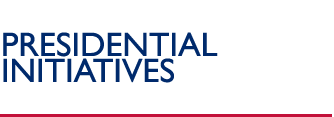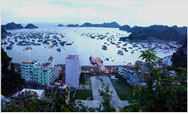 |
Trade for African Development and Enterprise Initiative

The Trade for African Development and Enterprise (TRADE) initiative, announced by President Bush in October
2001, strengthens the ability of African companies and businesses to expand regional and international trade, improves the enabling environment for business and trade, and helps countries mainstream trade into their development agendas.
TRADE enables African countries to take advantage of increased trade opportunities with the United States provided by the African Growth and Opportunity Act (AGOA) and the recently passed AGOA Acceleration Act of 2004. TRADE works with host-country governments and private sector partners, primarily through three regional trade hubs located in Botswana, Ghana, and Kenya.
- The Southern Africa Global Competitiveness Trade Hub (based in Gaborone, Botswana) sponsored several "Marketing Textiles and Handicrafts to the U.S. Market" seminars that reached approximately 300 participants in Botswana, Swaziland, Lesotho, Namibia, Malawi, and Zambia. Improved understanding of U.S. market requirements resulted in export contracts for textiles, as well as expanded business linkages among exporters to organize themselves to meet large marketing orders.
- As part of its strategic objective to expand AGOA exports to the United States, in 2004 the East and Central Africa Global Trade Competitiveness Hub (based in Nairobi, Kenya) organized three trade missions to the United States for handicraft and gift and textile and apparel manufacturers. Twenty-three companies from the region participated, resulting in exports of $3.5 million to the United States.
- In December 2003, May 2004, and August 2004, the West Africa Trade Hub (WATH) (based in Accra, Ghana) sponsored West African participation in trade missions to the United States focusing on marketing opportunities under AGOA. WATH established four new AGOA resource centers, bringing the total to 13 throughout the region, and trained more than 3,000 West African entrepreneurs on the requirements for exporting to the United States. WATH also coordinated the first two exports of "Category 9" merchandise (hand-loomed fabric, handmade articles from hand-loomed fabric, or folklore items) from West Africa under AGOA.
A Regional Hub Helps Expand Textile Exports to the United States
Through its AGOA Resource Centers, WATH helped Kente cloth weavers, such as Thompson Avornyotse, learn about U.S. market requirements. WATH sponsored Mr. Avornyotse's participation in the December 2003 AGOA Forum and West Africa International Business Linkages' textile and apparel trade mission to the United States. He and fellow entrepreneur George Ashiagbor exported the first AGOA Category 9 hand-woven textiles from West Africa. WATH also engaged a Malian-American volunteer expert through the U.S.-funded International Executive Service Corps to work with Mr. Avornyotse in Ghana to improve marketing expertise. As a result of these efforts, Mr. Avornyotse received an order for $7,000 worth of hand-woven Kente cloth.
- Trade capacity building assistance, as demonstrated in the U.S.-Southern Africa Customs Union Free Trade Agreement negotiations, is more effective and better appreciated with the use of trade experts from the Southern Africa region, whenever practicable.
- The ability to take advantage of AGOA opportunities depends on potential exporters' knowledge of the U.S. market. Technical assistance should provide a thorough understanding of sanitary and phytosanitary rules for agricultural and horticultural products, and should improve the export readiness of firms through participation in trade shows and AGOA seminars.
- Whenever possible, regional organizations and local firms should be used in the provision of training in order to develop local capacity.
- Small, privately held, owner-operator firms in Africa are willing to invest their own money to attend marketing opportunities if they are aware and convinced of the usefulness of international trade fairs.
Note: Results for this initiative were reported through USAID's consolidated reporting system
Back to Top ^
|


